

by Rob Stennett
This is the story of a succession. It is a story about passing leadership of one of the world’s most significant global evangelism efforts of the last century. It is a story involving millions of lives transformed by the love of Jesus. But this story doesn’t begin with missionaries traveling across impossible terrain to share the gospel. It doesn’t begin with shocking miracles in remote villages.
(We’ll get to all of that, I promise.)
But the best way to begin understanding this story is to get a sense of the leaders at its center.
Dick Eastman became connected with Every Home for Christ in the 1970s and has faithfully led as international president since 1988. He is passing the baton of leadership to Tanner Peake, who has served Every Home in many significant roles over the last decade. But instead of simply talking about their resumes (though both Dick and Tanner have impressive qualifications for leadership), I want to share why they are wired to lead this historic effort.
In my conversations with Dick and Tanner, I learned they are very different men with a very similar heartbeat for ministry. To help you understand them both, and the significance of this succession, I wonder if the best place to start is to share about their grandmothers.
Part 1: A Legacy of Prayer
Let’s start with Dick’s grandmother.
I sit down with Dick to hear his story on a snowy Colorado morning. He has just preached to the Every Home team at a staff meeting. He is fasting, so the only thing he has with him is a cup of black coffee and a well-worn Bible. (I later learned this is more than a Bible; it’s almost like a journal or an artifact, documenting a lifetime of ministry.)
Read More
I am curious about so many things. I want to know Dick’s story and how he is feeling about passing the mantle to Tanner Peake, his faithful, longtime partner in ministry. The succession planning is already in the works, and it is encouraging for me to see how joyful everyone is about the process. It reminds me of the way a family feels when they work together to plan an elaborate wedding — every detail matters because this is a once-in-a-lifetime celebration! In every conversation with the Every Home staff, I get the sense that this is a culmination of decades of ministry, and there is real anticipation about what lies ahead for the Every Home mission.
Dick sits down, sips his coffee, and asks, “What do you want to know?”
I decide to start at the very beginning: “How did you first meet Jesus?”
“My grandmother was sick and ready to die,” Dick answers.
I quickly learn one of Dick Eastman’s greatest strengths is his ability as a storyteller. He does more than answer a question; he gives you the full story so you can feel the answer.
Dick’s story of encountering Jesus involves a Pentecostal tent preacher who came through northern Wisconsin, knocked on the Eastmans’ door, and prayed for Dick’s very sick grandmother to be healed. And she was. That miracle deeply influenced Dick’s upbringing. Although he was not even born when his grandmother experienced miraculous healing, the Eastman family learned about the power of prayer and intercession. Prayer would become the guiding force of Dick’s life.
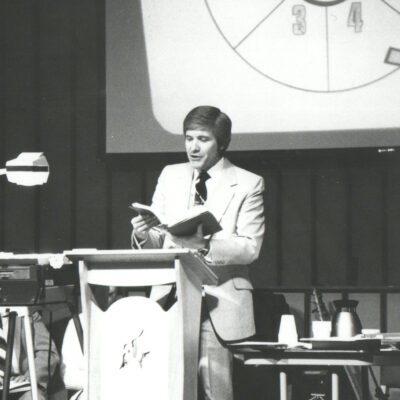
Dick teaching at a Change the World School of Prayer
Dick was raised knowing about God, but his faith was greatly tested in his youth. In his early teenage years, he didn’t spend time in prayer. He spent a lot of time at the local pool — stealing wallets.
Yes, you read that right. He told me the story himself, and I couldn’t believe it.
“My friend and I had kind of a scheme,” Dick explains. “We would go to the swimming pool in our city and walk around where everybody had their towels. They’d go in the pool, and they would leave wallets. We would drop off our towels on a wallet or a purse and then walk around a little bit. Then we’d go back and pick them up. Then we would go into the trees and see what we got.”
Dick’s mother had the sense (as mothers often do) that something was wrong. She tried to talk with him, but, to this day, he credits her prayers as the thing that changed his thinking. Her mother (Dick’s grandmother) taught her to pray, and she was praying for her son one Sunday morning when Dick awoke and heard her. That afternoon, his friend invited him to go to the pool.
“Mike called me, and he said, ‘Let’s go get some stuff,’” Dick says. “It was strange because I said, ‘I’m not going to do that anymore.’ And Mike said, ‘Well, then I’ll go get everything for myself.’
“And he did. He went to the pool to steal more wallets. But on that day, someone was watching. They called the police, and he was arrested.”
Dick pauses as he thinks about this. He could have easily been the one arrested, and I wonder if, in the silence, he’s thinking about how many other incidents and mistakes his mother’s prayers saved him from.
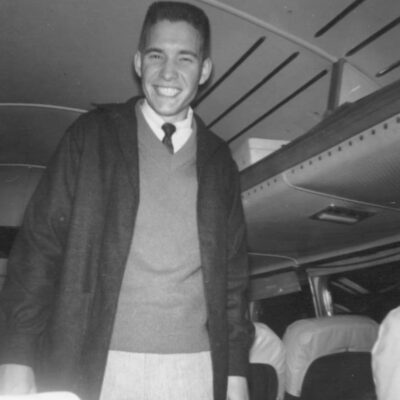
Dick pauses for a photo on a bus while traveling with a youth choir (December 1962)
A few years later, Dick was standing outside a church, waiting for his father, who faithfully served the congregation as a deacon. It was a low point in Dick’s faith. He wasn’t sure he believed anymore.
As he waited, a young woman from the youth group approached him. Her name was Twila, and she didn’t mince words.
“You really need Jesus in your life,” she said.
Dick responded curtly, “That’s none of your business.”
But Twila wouldn’t drop it. “You can come into the church right now and give your life to Jesus,” she said.
“I can’t go in there. I have a terrible headache,” Dick answered. This was more than an excuse. He’d been suffering from a migraine all day and could barely think.
“Why don’t you go in there, kneel down, and ask God to heal your headache?” Twila asked and then left.
Young Dick Eastman was defiant and ready to prove how powerless prayer actually was. He stepped inside, walked to the front of the empty sanctuary, and knelt. He remembers how he prayed: “God, if you’re real, and if Jesus is your Son, I want you to show me that. Show me that right now.”
There was silence for a moment, and then Dick heard a quiet voice asking: How is your headache?
At that moment, Dick realized the pain was gone. Completely gone. The migraine was healed. His head and heart were at peace. His life had just changed forever.
"God, if you’re real, and if Jesus is your Son, I want you to show me that. Show me that right now."
Dick told me this was his conversion moment — the moment that set him on a path of following Jesus.
What’s interesting is how much prayer has marked Dick’s life. He believes in the power of prayer, he preaches about it, and he shows others how to lead vibrant prayer lives. He does this because he sees how prayer affected him and his family tree. He knows everything starts with prayer because it was an honest prayer that changed his life. And he knows firsthand how his parents and grandparents changed his life. It’s why, ever since that day, Dick has urged others to pray for a hurting, lost world.
Part 2: The Power of Encounter
Now, let’s talk about Tanner Peake’s grandmother.
Tanner’s maternal grandparents — Lewis and Emerald — were ranchers in rural Montana, which Tanner describes as “a hard life on a desolate land.”
“No heat, no wood stove, no electricity, no indoor plumbing. For about three years, they lived in their chicken coop while they built a house,” Tanner says.
Read More
It was a brutal existence. Harsh winters. Ranching was nearly impossible. Provisions were hard to come by.
Tanner’s grandmother, Emerald, wasn’t raised as a Christian; in fact, she had little community or support at all, but she found herself seeking something more.
One starry night, she stepped outside, looked at the constellations, and began to speak in a language she never knew. It was unprompted and miraculous. Emerald felt God was out there, looking down on her. At that moment, she became a believer, but her husband, Lewis, was a skeptic.
“You’re drunk,” he said.
It’s hard to blame Lewis. He was orphaned at age 13 and survived by running moonshine across long, lonely stretches of Montana. He’d never felt cared for by anyone. So, it was hard to imagine a God up there who was watching.
But a couple of months later, Lewis had his own spiritual encounter and felt the same miraculous epiphany his wife described. He knelt down on a gunny sack right in the middle of his ranch and prayed to that God.
Lewis and Emerald felt like spiritual Magellans — as if they were the first people on earth to discover God. It probably sounds funny, but they were isolated and alone, without a church, spiritual mentors, or even friends with whom to process their experiences. They only had questions to ask and no one to answer.
The truth they sought finally arrived in the middle of a Montana snowstorm.
A pastor named Thomas Johnston felt stirred to visit a ranch in Ryegate. It was far from where he lived, but he could not ignore the voice inside him, urging him to go. He loaded his kids in the car and set out.
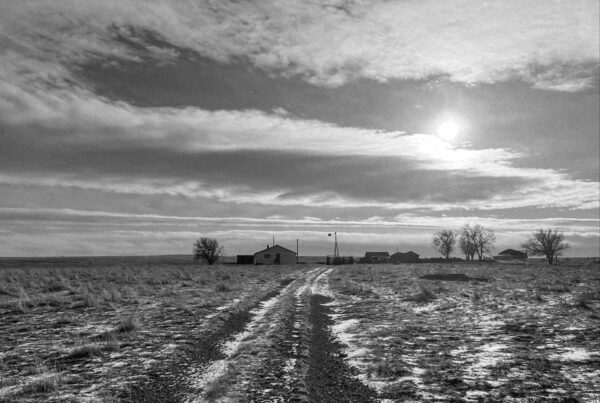
“The Bench” Montana where Tanner’s grandparents ranched on their homestead.
Tanner points out that traveling over 40 miles in the early 1900s with your family in a Model-T to visit a remote town was a big risk.
“I’ve talked to his [Johnston’s] daughter, who was there,” Tanner says. “She remembers the story. It was like something from Little House on the Prairie.”
Thomas Johnston knocked on the door and told Lewis and Emerald that he had come to share about God. They were thirsty for knowledge. Johnston took out a pocket New Testament and began to read. But what really convinced Lewis was the fact that Thomas Johnston was also a rancher and understood what it meant to ranch the land and survive in Montana. He was not a preacher from outside Lewis’ context; he was a local who knew the realities of what Lewis and Emerald were facing.
“It was late into the night,” Tanner continues. “And my grandpa and grandma and all their kids get down on their knees. And that’s the Lord’s entrance into my family’s story.”
Tanner grew up knowing this story in the same ways many kids know the story of how their parents first met. It was (and still is) a key part of his heritage. He knew about his grandfather’s love for God. And over the years, Tanner’s grandfather stood as a kind, influential, fatherly figure in Tanner’s life — a Christlike presence unlike anything else he experienced.
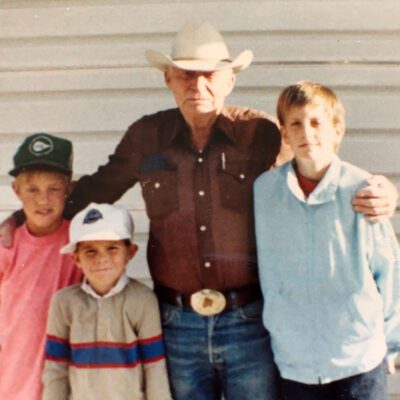
Tanner (second from left) with his grandfather
When Tanner was 16, his grandfather died. It was devastating.
“It’s not like my grandpa died,” Tanner says, “it’s like the most important person to me, in my life, passed away. At that time, I didn’t care about God. I was just literally running as fast as I could to any kind of hedonistic behavior.”
Tanner’s grandfather gave him one last gift: an inheritance that was intended for him to use to go on a mission trip.
“Even as a teenager, I felt the significance of this. I knew this was crazy for a guy whose mom was a homesteader and who had never left the country,” Tanner recalls.
Before Tanner knew it, he was on an international flight to India for a mission trip. He went out of obligation to his grandfather much more than due to an inspirational call.
“We were driving in the slums of India,” Tanner remembers. “I’m having the worst culture shock. I’m a Montana kid, and this looks nothing like riding my motorcycle and shooting gophers.”
The slums of India became Tanner’s “Damascus road” experience. He had an epiphany that’s marked his mission ever since.
Tanner describes it like this: “I look out, and I think it was the first time that I could see suffering. I’m in India, riding in a bus, looking at little kids and makeshift huts. I’m in true vertigo. I said, ‘God, I’m not sure if you’re real, but someone has to be bigger than all this suffering. Someone has to do something about it.’ I was bargaining with God. I had to believe that this wasn’t about getting my behavior in order. There had to be a transcendent narrative for everything I was seeing. And so, it was through the witness of suffering that I found God.”
"God, I’m not sure if you’re real, but someone has to be bigger than all this suffering."
These foundational stories of Dick Eastman and Tanner Peake illustrate the heart of the succession taking place and what it means for one generation to entrust the future of the ministry to the next. These are two stories that highlight the very essence of what makes Every Home for Christ effective.
Dick Eastman believes in the power of prayer to open doors and empower collaboration within the mission that God has given all of us. He believes in prayer, not just because it’s a nice thing to talk about, but because he has personally seen the power of prayer in his own life and story. His family was healed. His life was saved. He’s seen the fruit of having a personal relationship with God and spending time in prayer and Scripture every single day.
Tanner Peake believes in reaching every home, not just because that’s what you’re supposed to believe when you’re becoming the international president of Every Home for Christ, but because it’s foundational to his personal salvation story. His grandparents were changed by a knock on their door from a stranger who loved Jesus. It’s why Tanner (and everyone else in the organization) believes not only in reaching the homes that are easy to get to but journeying to the homes that take a lot of time and energy to reach. Tanner’s family tree was changed when someone literally knocked on his grandparents’ door. And that moment means so much to him that he still has that actual door displayed in his office.
Part 3: A Hope for the Future
Dick is entrusting Tanner with a ministry that has been stewarded well. I am amazed to hear how things have evolved over the years and how sophisticated the effort has become.
Read More
“Well, when we began, we obviously didn’t have cellphones or smartphones,” Dick explains. “The fax wasn’t even invented then. We have seen so many things on the level of technology that have helped us tremendously.”
Dick shares about the importance of an international database where they track the work being done and the areas yet to be reached. The work going on today is an enormous leap from the first home-to-home effort in 1953, led by Every Home founder Jack McAlister in Tokyo, Japan.
Jack stood outside a train station with a fellow missionary, trying to pass out tracts to every person walking through. It was an impossible task. For every person who received a piece of gospel literature, another 10 walked past. That night, Jack and his colleague had an epiphany — “Everyone lives somewhere. If we go to every home, we can reach everyone.”
They huddled around a map of Tokyo and began to imagine how they could systematically go home to home. The movement was born.
These days, it’s about much more than just going to homes (though that’s still where it all starts). It’s about creating disciples.
“When the ministry began, it was much more focused on just the initial evangelization,” Dick says. “We discovered that there are many people coming to Christ in remote villages where there’s not even a church within a couple of hundred miles. We were able to develop Christ Groups for these very new believers.”
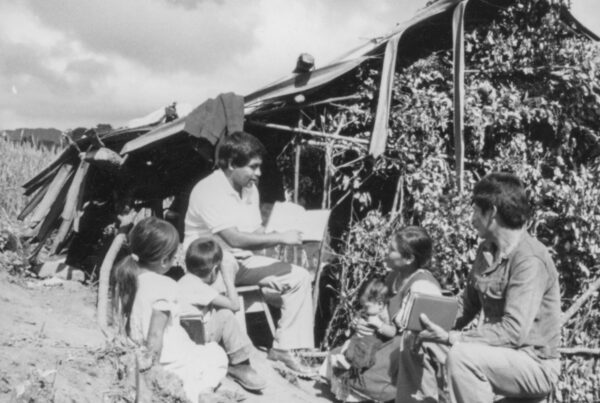
A pioneer missionary shares the gospel in Guatemala (1987).
Technology has also played a huge role in developing the mission. “We have a lot more tools available to us now,” Dick says. “We [can receive] testimonies and pictures instantly from all over the world.”
Dick shares about a time when it would take weeks or even months to hear about all the testimonies, Christ Groups planted, and baptisms happening around the world. Now, the team can share testimonies in seconds. They can stay connected through Zoom and WhatsApp. They are seeing the effectiveness of the ministry on social media.
I ask if technology is changing Every Home’s approach to leading the mission.
Tanner replies, “The gospel is more than simply a body of information, and it’s more than the platform or media it arrives on. At Every Home for Christ, what has never changed and will never change is our belief that, at the end of the day, the Good News is embodied in a set of eyes, in a life, in a heart, and, hopefully, in a face — a face that maybe even looks similar to somebody from your local district or village.”
It strikes me as a healthy balance: technology as a tool to help people share the gospel. For Every Home for Christ, you can never replace the people who actually go and make the human connection.
And the number of people engaged in sharing the gospel with Every Home is growing at an incredible pace.
Dick tells me, “I think when Dee and I came into leadership of Every Home for Christ in 1988, we probably averaged 20,000 to 25,000 monthly volunteers. We thought that was just absolutely wonderful! Well, in the past 12 months, it was about 180,000 monthly volunteers. We would not be surprised if, in the next three to five years, we reported 500,000 volunteers a month. That’s momentum in many different regions of the world. It’s just astonishing what God is doing.”
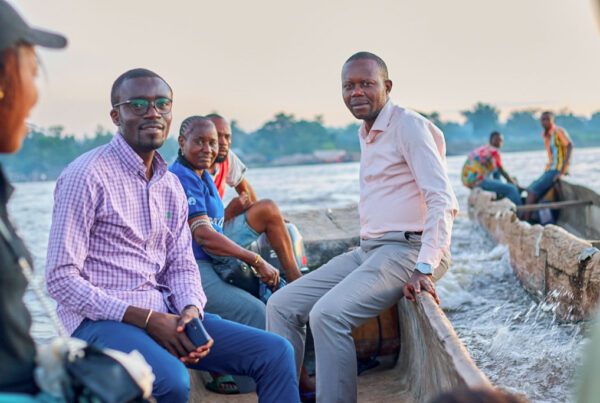
Believers travel by canoe to reach a neighboring village in Democratic Republic of the Congo (2022).
Two things stand out to me as I listen to both leaders talk about Every Home for Christ. First, Dick loves this mission and is very grateful to have been part of the work they’ve done over the last 45 years. It’s a defining part of his life and his story. And second, Tanner has a healthy respect for the size and scope of the global coordination required. He also knows what it means to become international president at a (relatively) young age and understands the challenges Every Home faces in a rapidly changing world.
It makes me wonder: Is it hard for Dick to hand off this mission? Does Tanner feel ready to take all this on?
I ask Dick about this directly. He tells me that a couple of years ago, he was asked about his leadership style by a journalist writing an article on the topic.
“My response was quite spontaneous,” Dick tells me. He smiles as he adds: “It’s four simple things: First, pray. Second, find the right people. Third, get out of their way. And finally, really pray. You might call it a ‘leadership-prayer sandwich’!”
I smile. In a world full of carefully packaged leadership philosophies, Dick’s is marked by profound reliance on God.
Dick has focused on empowering other leaders for over a decade. He also tells me that over the last few years, he’s really worked on bringing the next generation of leaders to the pulpit. He has offered Tanner and many other leaders in the organization a chance to speak and share their hearts and insight on what it takes to share the gospel message with every home on earth. Dick’s point is clear: this invitation to share in leadership isn’t something happening in the fall of 2022; this is a story of trust, discipleship, and collaboration that has unfolded over the last decade.
Dee Eastman, Dick’s wife, tells me, “I don’t have any reservations or hesitation at all. I’m glad it didn’t happen overnight. This gives us the chance to process and think about how we can be there to help them [Tanner and Bethany Peake] along the way.”
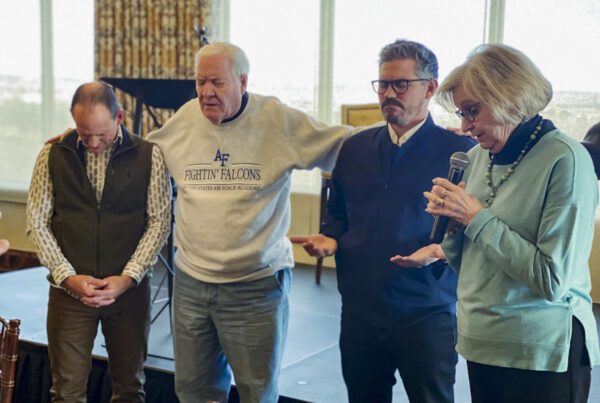
Every Home leaders offer prayer at a gathering.
Left to right: Tim Middlebrook, Dick Eastman, Tanner Peake, and Dee Eastman.
The title of this article, and the way Every Home is naming the process, is Entrusted, because the central idea in this moment is entrusting the next generation with the mission. This is not simply a corporate transition of leadership; this is one generation inviting the next to run with the vision.
“I think, early on, we established a good friendship and camaraderie with Tanner,” Dee says. “I could see how the Lord was using him. And then when Bethany became more involved, it was a beautiful picture of a couple working together in the ministry.”
When Tanner and Bethany became involved with Every Home, they were young parents with a newborn baby and a heart for missions. This is more than a job for the Peakes. Every Home is a family they joined as their calling, and their own family has grown during their years here.
“We’ve had the privilege of watching this couple [Dick and Dee Eastman] for 12 years,” Bethany says. “We’re not coming in from the outside. I would say we’ve grown up in this family in some ways. And it really feels like we’ve been able to see, modeled before us, what it looks like to have a rooted, deep spirituality and a rooted sense of self in Christ. They showed us we don’t have to put on a show. We don’t have to be something that we’re not. We just need to be grounded in who Christ has called us to be.”
The importance of the relationship between the Eastmans and the Peakes in this story can’t possibly be overstated. There is a real connection, and that translates in practical ways into making this succession smooth. Tanner doesn’t have to be oriented into the ministry or given a handbook so he can read up on the vision and values. Nor does he have to reboot what the mission is all about, leaving a wake of disorientation and staff transitions.
I think the truth is that this is the ideal way for a transition to take place. A young leader gets to grow up in the ministry, gets to understand what it means to lead from the president, and then infuses the mission with youth and creativity while still holding the essence of the heart it is founded upon.
“There is a ‘yes and amen’ to reaching people with the love and truth of Christ, regardless of the generation,” Tanner tells me. “And when you see the older generation bless the younger generation, there’s something very natural that emerges from your heart. There’s a desire to honor, a desire to include, a desire to bless back that I think is really beautiful. And so, we’re in the middle of that right now. We’re seeing Dick and Dee blessing Bethany and me. Even though we’re younger and we’re different, it’s not forced. I’m not just saying this because it is the right thing to say… No, truly, I desire, we desire, to honor that previous generation — Dick and Dee — but also all of the rest of those around the world.”
The rest of those around the world...
Something hits me as Tanner says this. I picture home-to-home outreaches in the mountains of Ecuador and local pastors sharing the gospel inside a flat in Paris, not too far from Notre Dame. I imagine a van full of missionaries driving across the bush in Kenya to hold a church service. I picture all of this, not because it’s romantic, but because it happens. Every day, local pastors and missionaries are working on doing what Jesus asked us to do as believers: “Therefore go and make disciples of all nations.”
When I ask Tanner about the “why” behind wanting to take on this role, he tells me a story. (Tanner, it turns out, is a storyteller too.)
“When we came to Every Home for Christ, I remember the first time we walked in the doors and walked upstairs. There was a beautiful map on the wall. And that map had faces of local believers, local Christians, followers of Christ, who were trying to impact their entire nation by taking the love and truth of Christ to each and every person. And that map captured our imagination in a way we probably weren’t really expecting.”
Tanner and Bethany bring up those faces every single time they talk about the work of Every Home for Christ. They are always quick to point out that their role is to serve. Tanner references a quote that captures this idea: “I live to be forgotten.”
It feels counterintuitive. Don’t we want to build a legacy? Don’t we want to create something that lasts forever?
But Tanner’s message is clear. He’s not building his own story. He is working to make sure Jesus and the work of local churches are elevated.
Tanner says it like this: “One of the burdens of our life for us as a couple has been: How do we serve people globally? How do we come behind the real hero who’s living in Namibia? Or how do we come behind the person in Cambodia and allow them to change their world? You’ve heard the quote, ‘Live to be forgotten.’ We’ve decided, let’s live to support and to make these people successful in what they do.”
I’m inspired by Tanner and Bethany’s passion, and I realize the road ahead isn’t an easy one. The future is complex as Every Home for Christ continues to strategize about how to actually reach billions of people on earth with the love of Jesus. But it’s also as simple as remembering the world can be changed by a mother’s Sunday morning prayer and a knock on a door in rural Montana.
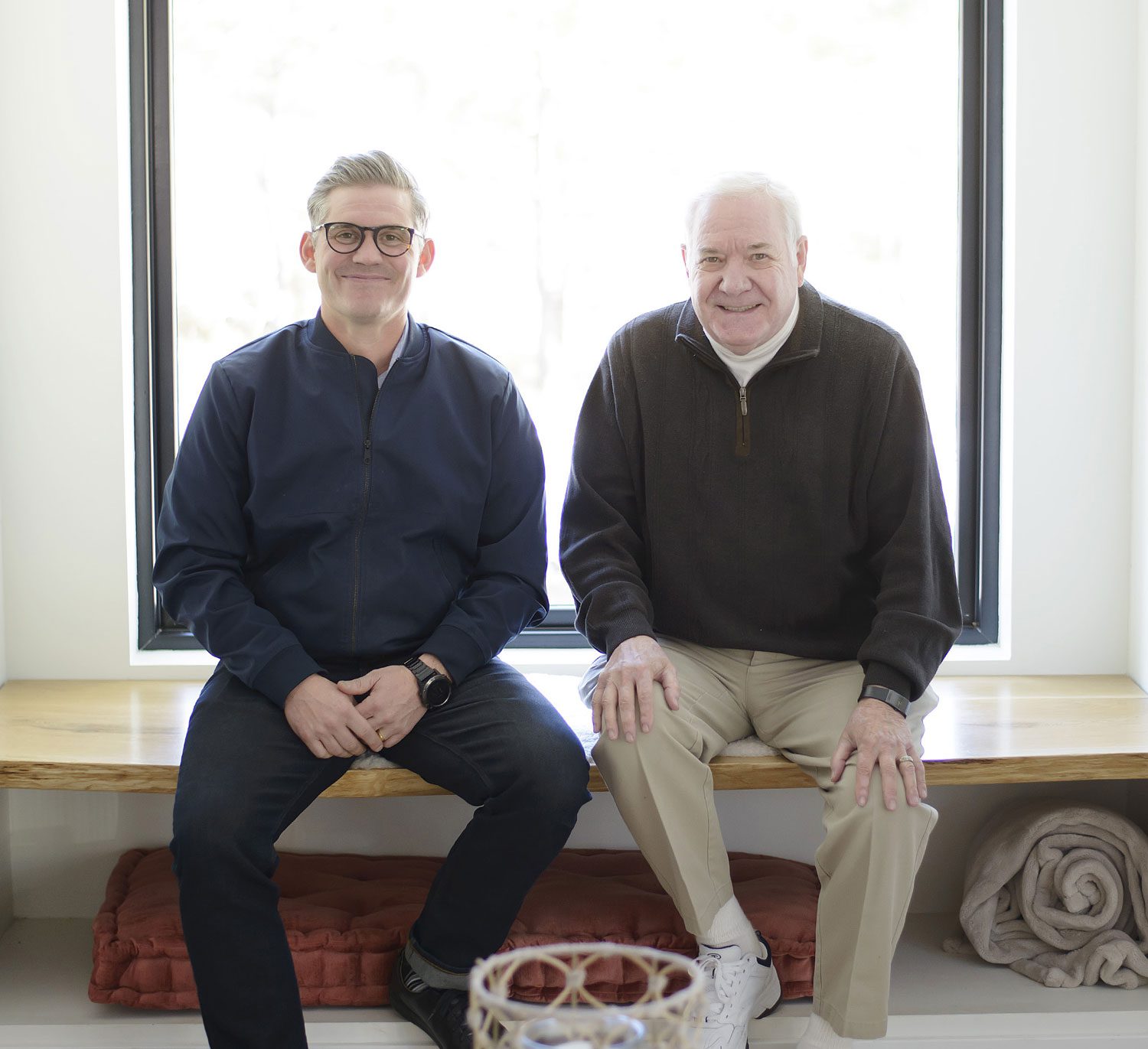
One of the greatest blessings of my time in leadership has been the “cloud of witnesses” (Hebrews 12:1) surrounding this ministry with me. We are only able to celebrate the joys and spiritual breakthroughs of these decades because of friends like you. Your partnership in prayer and resources is of eternal value, not just to me but to countless souls around the world. My prayer for Tanner as he steps into this role is that he will continue to be joined by this community of partners committed to the future of Every Home for Christ. Join us today — for the future.
— Dick Eastman


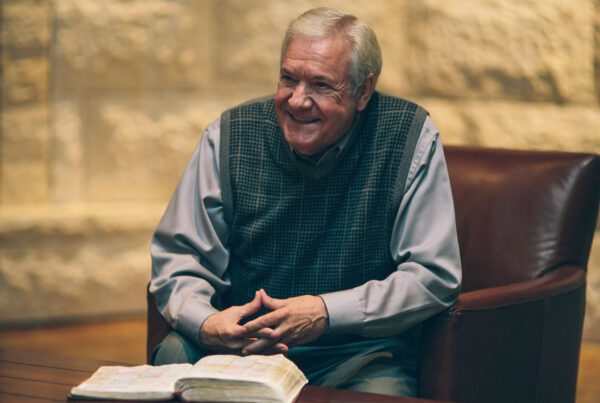
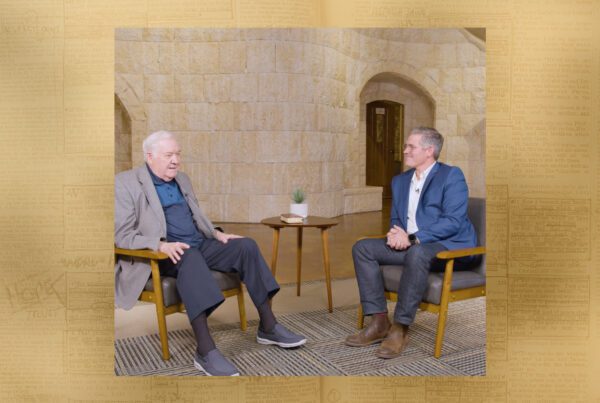
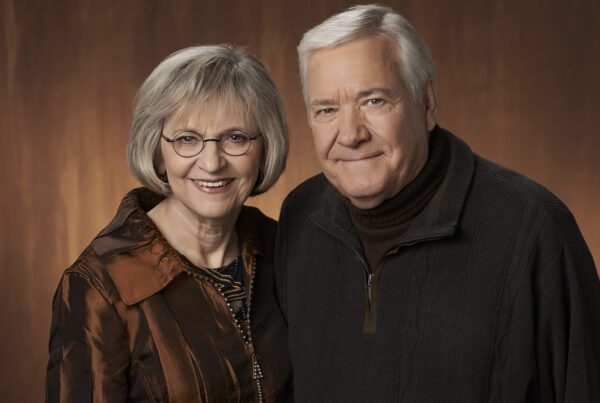
This is absolutely fantastic. A leader has not really succeeded until he’s found a successor. I congratulate Dick, for his foresight. And I pray for Tanner that the Lord who helped Dick will help him too, especially in this end times. God bless you.
Dear Every Home friend,
Greetings to you in the Name of Jesus Christ!
I am from India, Please Pray for India. India needs Gospel.
Visiting to do ministry among the hill tribes. Pray for ministry and help us by Every Home
with Native Bible and Gospel tracts.
With Love!
Baby John Vellaramala
and Ponnamma John V.